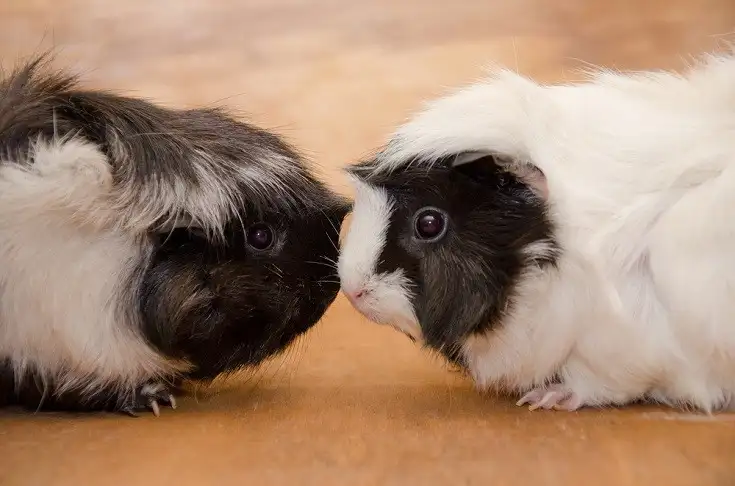Guinea pigs, also known as cavies, are popular pets known for their adorable appearance and gentle nature. If you’re considering getting a guinea pig as a pet, you may wonder about their temperament and whether they can be aggressive. In this article, we’ll explore the behavior of guinea pigs and shed light on whether they are naturally aggressive animals.

Understanding Guinea Pig Behavior
Before we dive into the question of aggression, it’s important to understand the typical behavior of guinea pigs. These small rodents are social creatures that thrive in the company of their human caretakers and other guinea pigs. They are generally friendly, affectionate, and curious animals, making them great companions for both adults and children alike.
Guinea pigs communicate through various vocalizations, body language, and behaviors. They may squeak, purr, or whistle to express different emotions, such as happiness, fear, or hunger. Understanding their unique ways of communication is essential in interpreting their behavior and addressing their needs.
Natural Temperament of Guinea Pigs
Unlike some other small animals, such as hamsters or mice, guinea pigs are not known for being aggressive. In fact, they are considered one of the most docile and gentle pet options available. Their friendly nature and overall calm demeanor make them suitable for households with children.

Guinea pigs are prey animals by nature, which means they have evolved to be more skittish and cautious. They have a natural instinct to flee or hide from potential threats. While they may exhibit some signs of fear or nervousness, it is rare for them to display aggressive behavior towards humans or other animals.
Factors Influencing Guinea Pig Behavior
While guinea pigs are generally peaceful animals, it’s important to consider that individual personalities can vary. Factors such as genetics, socialization, and previous experiences can influence the behavior of a guinea pig. Some guinea pigs may be more outgoing and sociable, while others may be more timid or reserved.
Proper socialization plays a crucial role in shaping a guinea pig’s behavior. When they are handled gently and exposed to positive interactions from an early age, they are more likely to be friendly and comfortable around humans. Regular handling, playtime, and providing them with a stimulating environment can contribute to their overall well-being and temperament.
Signs of Aggression in Guinea Pigs
While aggression is not a common trait in guinea pigs, there are certain signs that may indicate a problem or discomfort. It’s important to be aware of these signs and address them promptly:
- Biting: Guinea pigs generally do not bite unless they feel threatened or frightened. If a guinea pig bites, it’s essential to assess the situation and identify the cause of their behavior. It could be due to mishandling, pain, or a lack of trust.
- Chasing or lunging: Some guinea pigs may exhibit chasing or lunging behaviors, especially during territorial disputes or mating. This is more common among male guinea pigs. Neutering or separating them can help reduce such behaviors.
- Teeth chattering: Guinea pigs may chatter their teeth when they are agitated or annoyed. This can happen if they feel cornered or uncomfortable in their surroundings.
Promoting a Positive Environment
To ensure a harmonious and stress-free environment for your guinea pig, consider the following tips:
- Provide ample space: Guinea pigs need sufficient space to explore, exercise, and retreat to their hideouts. A spacious cage or enclosure with hiding spots and toys can help them feel secure.
- Offer a balanced diet: A guinea pig’s diet should consist of high-quality hay, fresh vegetables, and a small amount of pellets. A nutritious diet promotes their overall well-being and can positively impact their behavior.
- Handle with care: When handling a guinea pig, it’s important to be gentle, supporting their body with both hands. Avoid sudden movements or loud noises that can startle them.
Conclusion
In conclusion, guinea pigs are generally gentle and friendly animals, making them excellent pets for both individuals and families. While aggression is not a common characteristic of guinea pigs, it’s crucial to understand their behavior, provide proper socialization, and address any signs of discomfort promptly. By creating a positive environment and offering them love and care, you can enjoy a rewarding companionship with your guinea pig for years to come.
Remember, each guinea pig is unique, and their behavior may vary. Observing their individual temperament and meeting their specific needs will help foster a strong bond between you and your furry friend.
So, if you’re considering adding a guinea pig to your family, rest assured that their gentle and sociable nature outweighs any concerns about aggression. Enjoy the delightful company of these charming creatures and create lasting memories together!
